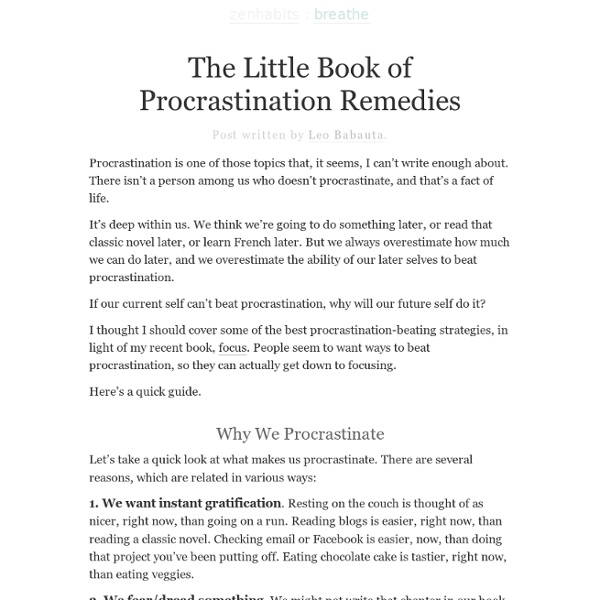7 Smart Ways to Deal with Toxic People
Don’t let toxic people rent space in your head. Raise the rent and get them out of there. Surviving the ups, downs, and lightning storms of other people’s moodiness can be quite a challenge. It’s important, though, to remember that some moody, negative people may be going through a difficult stage in their lives. They may be ill, chronically worried, or lacking what they need in terms of love and emotional support.
60 Small Ways to Improve Your Life in the Next 100 Days
Contrary to popular belief, you don’t have to make drastic changes in order to notice an improvement in the quality of your life. At the same time, you don’t need to wait a long time in order to see the measurable results that come from taking positive action. All you have to do is take small steps, and take them consistently, for a period of 100 days. Below you’ll find 60 small ways to improve all areas of your life in the next 100 days.
11 Ways to Cure Someday Syndrome
Editor’s note: This is a guest post from Alex Fayle of the Someday Syndrome blog. Someday Syndrome: not doing what you want to because you don’t know what it is, because you’re procrastinating about it, or because you have too much stuff getting in your way. Everyone suffers from Someday Syndrome at some point in their lives, often catching it repeatedly. For me, most recently, I’d been saying that I really should give running a try without doing anything about it. You probably have something similar going on in your life – a project, a task, a goal – that you just haven’t got around to doing yet.
16 things I know are true but haven't quite learned yet
There’s a difference between knowing something and living as if it were true. At the end of 2013, these truths are all lingering on that awkward threshold, for me anyway. 1) The sooner you do something, the more of your life you get to spend with that thing done — even though it takes less effort (or at least no more) than it will later. It’s the ultimate sure-thing investment and I pass it up all the time. 2) I never regret working out.
The Neuroscience Of Change—Or How To Reset Your Brain : The World
Learn how to rewire your brain by changing how you think through a simple four-step approach. July 07, 2011 The mysteries of the mind and brain are many and complex. Neuroscience, through the magic of technology is just beginning to unravel some of them. Given that my livelihood revolves around creativity, I have become fascinated with neuroplasticity. Neuroplasticity is the mind's ability to change the brain.
How to Get Anything Done
Let’s say you had a baby. Congratulations! Your baby is the best human ever! You love your baby. You celebrate as it starts to crawl.
Mental Enhancements
The perfecting of one's self is the fundamental base of all progress and all moral development. Confucius Transhumanists are interested in metaprogramming, rewriting the programs of our minds so that we become more efficient, dynamic, positive - you name it.
33 Rules to Boost Your Productivity
Heuristics are rules intended to help you solve problems. When a problem is large or complex, and the optimal solution is unclear, applying a heuristic allows you to begin making progress towards a solution even though you can’t visualize the entire path from your starting point. Suppose your goal is to climb to the peak of a mountain, but there’s no trail to follow. An example of a heuristic would be: Head directly towards the peak until you reach an obstacle you can’t cross. Whenever you reach such an obstacle, follow it around to the right until you’re able to head towards the peak once again. This isn’t the most intelligent or comprehensive heuristic, but in many cases it will work just fine, and you’ll eventually reach the peak.
21 Ways Rich People Think Differently
World’s richest woman Gina Rinehart is enduring a media firestorm over an article in which she takes the “jealous” middle class to task for ‘drinking or smoking and socializing’ rather than working to earn their own fortune. What if she has a point? Steve Siebold, author of ‘How Rich People Think’ spent nearly three decades interviewing millionaires around the world to find out what separates them from everyone else. It had little to do with money itself, he told Business Insider.
Increase your productivity at work by letting go of negative mental clutter
My alma mater is currently ranked number one in all of the college men’s basketball rankings. They’ve been in the top spot for 11 of the 14 weeks of the polls, and were number one in the preseason. There are five games left in the regular season, and all of the teams Kansas has left to play would love to see the Jayhawks lose. Colorado, Oklahoma, Oklahoma State, Kansas State, and Missouri fans aren’t the only ones who want to see Kansas mess up their record in the last five games.
11 Simple Ways to Improve Your Memory
Whether you want to be a Jeopardy! champion or just need to remember where you parked your car, here are 11 things you can do right now to turn your mind from a sieve into a steel trap. These days we’re all about things being faster.



